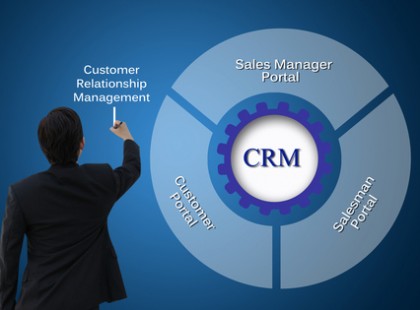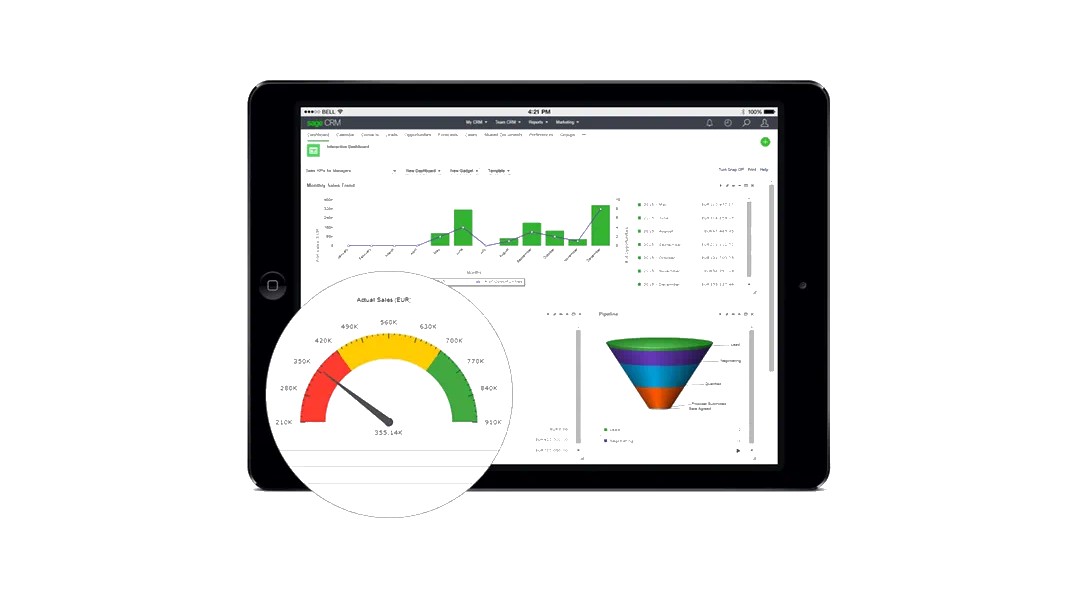5 powerful myths and 5 inconvenient truths about CRM you absolutely need to know
Still unsure if you need a CRM solution? We'll help clear things up

- Myth 1. All CRMs are the same
- Myth 2. CRMs are too expensive
- Myth 3. CRMs are only for huge enterprises
- Myth 4. CRMs need a lot of training and knowledge to use
- Myth 5. CRMs present integration challenges
- Truth 1. Not all CRMs are good
- Truth 2. Your new CRM doesn’t guarantee success
- Truth 3. The most expensive CRM isn’t necessarily the best
- Truth 4. People remain key to your CRM deployment
- Truth 5. It’s okay to ask for help regarding your CRM
CRMs are used by many modern businesses, but that doesn’t mean that there aren’t some companies out there holding on to some reservations. Fortunately, many of these stem from a lack of awareness so we’ve outlined five of the most common CRM myths today as well as a few inconvenient truths. Once you’ve understood these, it will become a lot easier to work out the best CRM software for your needs.
As with all business software, misconceptions are rife. Just take a look at some of the best cloud storage solutions on the market. Despite the ubiquity of cloud computing, concerns around the potential cybersecurity risks that SaaS solutions could introduce are difficult to completely eradicate - even if they aren’t backed up by reality.
That’s why we feel that it’s important to clearly outline the falsehoods that continue to hold back CRM adoption. Unfortunately, these can have a really damaging effect on businesses, hindering productivity, suppressing collaboration, and just generally preventing companies from reaching their full potential.
So if you remain unconvinced that you need a CRM solution, keep reading as we dispel the myths around this important business tool - and introduce a few inconvenient truths too.
Reader Offer: Save 18% on Monday.com annual memberships
Monday.com is an easy-to-use and customizable work management platform, enabling teams of all sizes to plan, manage and centralize work. Get started now and boost your team's communication and productivity.
Preferred partner (What does this mean?)
5 powerful myths about CRM
Myth 1. All CRMs are the same

This one couldn’t be more wrong. Just taking a look across industries there are real variations in the types of CRM on offer. There are the best CRMs for real estate firms, the best insurance CRMs, and many more.
Each CRM will come with its own strengths and weaknesses so businesses must undertake substantial research to determine which CRM is the right one for their needs. Some of our highest-rated CRMs, include Salesforce, HubSpot, and Zoho. But the only way to be sure that a CRM meets your needs is to conduct some first-hand research. Many platforms offer free trial periods so that’s a great way to try multiple different CRM tools before committing.
One of the primary ways that CRMs differ from one another is in terms of the features on offer. Some common functionalities to look out for are contact management, sales forecasting, marketing automation, and analytics. But don’t take anything for granted. Some features may be included, while others won’t be - plus, you might have to sign up to a specific payment tier to gain access to a particular feature. And even within feature lists, there may be nuances - one platform’s analytics, for example, is unlikely to work in exactly the same way as another’s.
Myth 2. CRMs are too expensive
This is the kind of myth that circulates around many business solutions. The truth is that CRMs are available at a range of prices. In fact, we’ve outlined some of the best free CRM software available so you may not need to spend anything at all to get your hands on a top-quality CRM platform.
However, even if you’ve decided that a free platform isn’t right for you, there’s still plenty of affordable options out there. And, as mentioned, many CRMs offer a free trial period, so you can try a solution before you need to ask the IT department to increase your budget.
The main thing to bear in mind is that most CRM contracts are subscriptions, so prices will add up over time. Unlike traditional software solutions, CRM tools are usually delivered over the cloud so are subject to ongoing (usually annual) fees rather than a one-time purchase. In addition, check the customer reviews and the amount of uptime promised by the vendor. Although this isn’t a direct cost, unexpected disruptions can damage a company’s takings and leave revenue streams dented.
This works both ways, however. Consider whether your company can afford to be without a CRM. This business solution can boost conversions and improve the customer experience, ultimately leading to higher profitability in the long term. Don’t view CRM costs simply as short-term outgoings. They could make a difference to your company’s future financial sustainability.
Myth 3. CRMs are only for huge enterprises

Although some CRMs can support the scale that comes with multinational enterprises, others are designed to target smaller operators. In fact, we’ve compiled a list of the best CRM for small business and the best CRM for startups to underline the fact that these tools are far from being of exclusive use to large enterprises.
It may have once been true that CRM apps largely targeted enterprise customers. Larger firms had access to huge data sets and found it challenging to manage this information, secure it, and allow it to be shared among all their internal and external stakeholders. At this time, it was also more likely that maintaining a CRM depended on having access to fair deal of manual resources - again, only likely to be the preserve of larger organizations.
However, digital transformation has come to all companies - large and small. And today, CRM platforms are equally inclusive. Some even have features that are specifically designed to streamline business processes for smaller organizations, such as extensive third-party integrations and numerous customization options, with ease of use to match. Even sole traders may find a CRM useful.
Myth 4. CRMs need a lot of training and knowledge to use
It’s true that some CRMs require some technical expertise, but many others are designed to support businesses straight out of the box. Many boast an intuitive design as one of their main selling points. As CRMs have become more widespread, it stands to reason that they have become more accessible to individuals lacking in technical knowledge or programming skills.
Modern CRMs are designed for use by sales staff, marketing personnel and other employees - they are not the reserve of IT nerds. As such, much of the functionality is self-explanatory. Drag-and-drop features are employed where relevant and elsewhere, you’ll likely need to just to point and click. Customer support options should also be available should further assistance be required.
What’s more, it’s worth remembering that CRMs are designed to make the lives of employees easier - not harder. As such, automation is increasingly used to ensure that not only is no technical work required, there’s no manual work required at all. In the same vein, AI tools are also being incorporated to reduce the burden on staff even more.
Myth 5. CRMs present integration challenges
Undoubtedly, the business technology landscape is more complex than ever and the pace of new deployments is showing little sign of slowing. On the surface, this can present a bit of a headache for IT teams that have to consider how a new CRM will work with their existing IT stack. However, most CRM providers have thought about how their software integrates with other solutions to take some of the worry away.
The number of third-party integrations offered by CRM platforms can vary and is recognized as a real strength of some platforms. Solutions like Insightly are really part of a wider suite of tools, largely focusing on project management.
Although your CRM solutions may not quite be the single app that is able to take on all your business processes, it is likely to connect with a wide range of different tools. This makes it easy for your different departments to communicate with each other so you can avoid fragmented business practices.
5 inconvenient truths about CRM
Truth 1. Not all CRMs are good
Although the benefits of CRM tools are many, that doesn’t mean that all CRMs are worthy of your consideration. First of all, the plethora of CRM solutions on the market means that some won’t necessarily meet your needs. They may be ideal for other industries, different markets, or different-sized organizations, but a bad fit for you. Moreover, some CRM tools simply aren’t very good.
There are various reasons why a CRM may be inadequate. It may lack integrations, it could be expensive or may boast a steep learning curve. Similarly support options may be limited. It’s also worth getting some hands-on experience with the features being offered. Do these do what they’re supposed to? If not, it may be worth looking at other options.
Truth 2. Your new CRM doesn’t guarantee success
CRMs can provide marginal gains for businesses but they won’t magically turnaround a failing company. Perhaps it’s a good time to refresh ourselves regarding what a CRM actually does. It can help manage interactions with existing customers and leads, but if your sales or customer experience teams are poorly prepared or have inadequate information, you are still likely to lose out to your competitors.
There are many other CRM features that businesses can mistakenly think will transform their operations overnight. For instance, call and email logs can help businesses with the tracking of customer communications, but they won’t necessarily tell them what to do with this information. It will still depend on your employees to use the relevant details as part of their future calls and follow-up sales tactics.
Similarly, reporting and analytics features can completely revamp a company’s marketing output - but only if insights can be exported and shared easily. Managers will have an important role in ensuring that any insights generated by a CRM end up in the right hands.
Truth 3. The most expensive CRM isn’t necessarily the best

There are cheap CRMs, expensive ones, and even free ones but the price for a CRM won’t necessarily tell you if it’s good value for money or if it’s the right choice for you. For instance, Salesforce, where prices start from $25 per user a month, is more expensive than many of its competitors, but it still ranked as our number one choice of CRM.
Every company is different, so finding the right CRM isn’t simply a case of seeking out the most expensive one your budget will allow. Instead, take the time to examine what features you receive for the price. Look at the different payment tiers available and see what free options, if any, suit your needs.
Cheaper doesn’t necessarily mean worse so don’t discount a CRM solution simply because it’s affordable. Equally, don’t be fooled by CRM platforms that boast the slickest graphics or snazziest designs. Functionality will always trump aesthetics, so take care to examine how a CRM platform meets your needs before looking at the price tag.
Truth 4. People remain key to your CRM deployment
The clue is in the name. Customer relationship management can only be enhanced by technology so much. Relationships are all about people at the end of the day. So remember that alongside your new CRM deployment, staff training will remain important.
Consider whether you should monitor customer conversations to identify whether there are any improvements that could be made that would boost conversions. Many of the best employee experience tools include e-learning modules that allow them to focus on professional development at their own pace.
Mobile functionality is another CRM feature to look out for that can improve the relationships your employees have with customers. In an age of hybrid working, customers expect staff to be able to pull up relevant information wherever they are. Access to this information on mobile devices will improve the customer experience and foster stronger relationships.
Truth 5. It’s okay to ask for help regarding your CRM

This is true of all business software - even the most intuitive. CRM platforms can include a plethora of features and it might not be immediately clear how to get the most from them. Fortunately, many platforms boast help forums or customer support channels - whether email, telephone, or AI chatbot. Make the most of these support channels if ever you’re feeling a little lost.
Alternatively, you don’t have to utilize formal support channels. Remember your colleagues and managers may have more experience with your CRM solution and be only too happy to answer any questions you may have. Start working on your customer relationships by forging tight-knit partnerships in work. Discuss how best to use your CRM. You never know, you might unlock a new benefit that takes your deployment to the next level.
Are you a pro? Subscribe to our newsletter
Sign up to the TechRadar Pro newsletter to get all the top news, opinion, features and guidance your business needs to succeed!
Barclay has been writing about technology for a decade, starting out as a freelancer with ITProPortal covering everything from London’s start-up scene to comparisons of the best cloud storage services. After that, he spent some time as the managing editor of an online outlet focusing on cloud computing, furthering his interest in virtualization, Big Data, and the Internet of Things.

